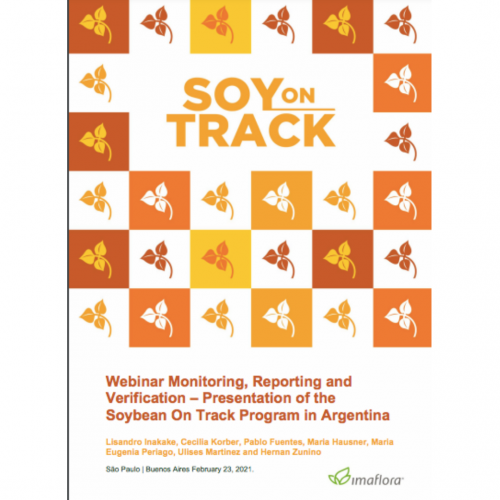Chaco Argentino: follow the discussion
The report of the webinar on monitoring, reporting and verification models carried out in a partnership between Imaflora's Beef on Track Program and Rever Consulting, funding by the National Wildlife Federation (NWF), to inspire representatives of the beef chain in the Argentine Chaco is now available on the website of the Soy on Track Program.
The document aims to provide transparency to discussions about engaging other Latin American countries, such as Argentina and Paraguay, in the Soy on Track program and motivating the local chain to set up a monitoring system for the purchase of soybean sourced from the Argentine Chaco region.

Engagement
The engagement process in Argentina began in November 2020 through virtual meetings with organisations such as Fundación Vida Silvestre, Carne Sostenible de América Latina, as well as local traders and retail chains. The webinar was attended by 25 participants, in addition to Imaflora’s representatives.
Two monitoring, reporting and verification tools used in Brazil were given as examples for the development or improvement of protocols to ensure greater transparency along the supply chain: the Auditing Benchmark for Commitments of the beef chain and the Beef on Track Program.
The skill-building webinars were facilitated by Rever, a consulting firm that works with sustainable supply chains focused on free deforestation chains. In addition to developing assessment, monitoring and verification tools for the chain, Rever also produces and disseminates content and trains and inspires new players at the regional and global level, as was done with the Argentine audience. "Initiatives such as this are fundamental for regional alignment with global expectations based on accumulated knowledge and experience, without the need to reinvent the wheel," said Pablo Fuente, partner and director at Rever.
Monitoring slave labour is still a challenge in the country's value chains
The inclusion of social issues would be a great step forward in the monitoring of production chains in the country.
Challenges of COP26
"If we manage to keep our forest standing, we have a very large carbon asset that can be traded," states Marina Piatto, from Imaflora.
New Soy Moratorium Protocol leads to adjustments in processes and content
The review of audit protocol 2019/2020 leads to remedial action plans, soybean triangulation check methods, increased transparency through reporting disclosure, and an audit procedure that does not require a physical presence





